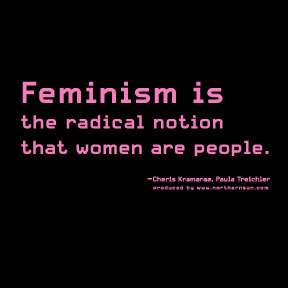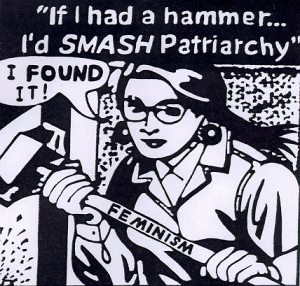 The US Council of Catholic Bishops has no idea what radical feminism actually looks like, and apparently neither does Marissa Mayer.
The US Council of Catholic Bishops has no idea what radical feminism actually looks like, and apparently neither does Marissa Mayer.
I noted in an earlier piece on Patheos that the Congregation for the Doctrine of the Faith’s statement condemning the Leadership Conference of Women Religious in the United States highlights that one of the problems with the nuns’ work is “radical feminist themes.” I’d really love to know what the bishops think radical feminism is. I’d be happy to instruct them, using any number of primary or secondary sources discussing radical feminism as one theory within feminism. Samantha Bee expertly uncovered the truth about these “femi-nunsies” with Sister Simone on The Daily Show.
The bishops are not alone in sounding the radical alarm when it comes to feminism these days. When Marissa Mayer was appointed president and CEO of Yahoo!, becoming the first female in that position for any Fortune 500 company, the moment was lauded and analyzed by many commentators. And then,
“Journalists swiftly exhumed videotape of Mayer addressing the term. ‘I don’t think that I would consider myself a feminist,’ Mayer told an interviewer during her time as a Google exec. ‘I don’t have the militant drive and the chip on the shoulder that sometimes comes with that. And I think it’s too bad, but I do think that feminism has become, in many ways, a more negative word.’”
Amanda Hess sums up a range of responses to Mayer:
“Cue the commentary. Marissa Mayer is a feminist. Maybe just a trickle-down feminist. Or else a nightmare. Or a disappointment. Or a mommy warrior. Does it even matter? Leave Marissa Mayer alone! No, leave feminism alone! Let’s all stop talking about it (starting now)!”
Jessica Wakeman captures some of my frustration with Mayer’s comment:
“Feminism is a century’s-long social justice movement that has made life better for women and girls and, yes, men and boys, too. It bothers me when people do not show it due respect. It especially bothers me when someone in a male-dominated field who has benefitted from the spoils of feminism doesn’t show it due respect. And while I understand that hectoring other people to appear grateful won’t win me any pats on the back, it’s a fair enough gripe to have in such a big moment of ‘I’m not a feminist but …’”
By dismissing feminism as a negative word, its militant drive, only for someone with a chip on her shoulder, she not only dismisses the century that Wakeman mentions, she disregards women’s anger completely (more on that in a moment), and she seems to have gotten her instruction on what feminism is from Rush Limbaugh. Because that’s how he has now branded all of it. Anyone who thinks that is what feminism is reveals themselves to be intellectually lazy, in my opinion. She’s obviously smart and experienced enough, even at 37, to know better.
To be clear, all kinds of people think this about feminism (thanks, Rush). What Mayer says is almost the same response I got nearly twenty years ago from a pastor in my hometown who learned I was going to graduate school in part because I was interested in feminist theology. “But you’re not one of those feminazis, of course …” It’s still the response I get from people both in and outside of my classroom.
 But really, what’s wrong with angry women anyway? Is Mayer simply revealing the fact that top-tier success in a male-dominated industry demands that you not be seen as one? Couple this with the feminist = angry equation, and there you have it.
But really, what’s wrong with angry women anyway? Is Mayer simply revealing the fact that top-tier success in a male-dominated industry demands that you not be seen as one? Couple this with the feminist = angry equation, and there you have it.
Audre Lorde wrote a masterpiece essay on “The Uses of Anger” a generation ago. It was the keynote address to the National Women’s Studies Association in 1981, dealing extensively with the problem of racism in a white-upper-class-dominated feminism. Among other things, she notes that anger is often the most meaningful response to injustice.
“Focused with precision, it can become a powerful source of energy serving progress and change. … Anger expressed and translated into action in the service of our vision and our future is a liberating and strengthening act of clarification. … It is not the anger of other women that will destroy us but our refusals to stand still, to listen to its rhythms, to learn within it.” (Sister Outsider, p. 127, 130).
If the intersection of poverty with racism and sexism and homophobia doesn’t make you angry, then you don’t understand it.
If you think that you can become the first female president and CEO in the Fortune 500 without generations of feminism, then you don’t understand it.











